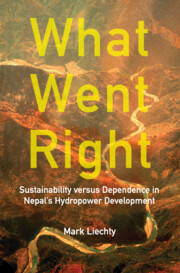Book contents
- Frontmatter
- Dedication
- Contents
- Preface
- Acknowledgments
- List of Abbreviations
- 1 A Corporate Vision: Business as Development Philosophy
- 2 The Butwal Technical Institute, Tinau, and the Origins of the Butwal Power Company
- 3 Andhi Khola
- 4 Jhimruk
- 5 The “Great Upheaval”: Khimti and the Limits of the Hoftun Hydropower Vision
- 6 Melamchi and the Rush to Privatization
- 7 Privatization: The Long Haul
- 8 The New BPC: Cultures in Conflict
- 9 Conclusion: From Seed, to Plant, to Seed
- Bibliography
- Index
- Miscellaneous Endmatter
9 - Conclusion: From Seed, to Plant, to Seed
Published online by Cambridge University Press: 23 April 2022
- Frontmatter
- Dedication
- Contents
- Preface
- Acknowledgments
- List of Abbreviations
- 1 A Corporate Vision: Business as Development Philosophy
- 2 The Butwal Technical Institute, Tinau, and the Origins of the Butwal Power Company
- 3 Andhi Khola
- 4 Jhimruk
- 5 The “Great Upheaval”: Khimti and the Limits of the Hoftun Hydropower Vision
- 6 Melamchi and the Rush to Privatization
- 7 Privatization: The Long Haul
- 8 The New BPC: Cultures in Conflict
- 9 Conclusion: From Seed, to Plant, to Seed
- Bibliography
- Index
- Miscellaneous Endmatter
Summary
From my perspective, the most important story is BPC's impact on hydropower sector development in Nepal, outside of BPC itself.
—Nepali hydropower executive, 2016The Butwal Power Company's (BPC’s) founder, Odd Hoftun, has long thought of his development efforts in Nepal as analogous to planting a seed, tending it with “faith and courage,” and waiting to see how it might mature (Hoftun 2004). From his early days in Nepal, to his establishment of BPC in 1965, through the company's growth and development outlined in this book, Hoftun has watched BPC evolve in ways that are deeply satisfying in terms of his goals of human capacity building and promoting ethical business practices, but also increasingly personally dispiriting. As the seedling matured it increasingly took on qualities required of it by the soil and environment in which it had to grow. Despite his best efforts, Hoftun could only watch as his plant began to bear fruit that diverged from his ideals but reflected the demands of capitalist economics, global and local.
Symbolically, Hoftun's presence in the company also dwindled—from his early decades as general manager, through the disappointing privatization process where his hopes of securing board control for Interkraft Nepal (IKN) were reduced to a tiny 6.9 percent share of the newly privatized company after 2003. Although Hoftun had hoped to play a role in the new BPC, within a few years after privatization IKN's role dwindled to zero. From that point onward IKN could only wait and watch as its annual BPC dividends went to pay off its BPC debts. It took twelve years for the tiny, nonprofit IKN to clear its debts (with interest) before finally, in 2015, selling its BPC shares and severing ties completely. Hoftun had promoted an ethic of corporate nationalism—building hydropower infrastructure to strengthen Nepal's capacity at every level from rural electrification and urban industrialization to skilled manpower, to equipment production and construction skills, to national energy independence. As recently as 2006 Hoftun could write, “I have always looked at BPC as a small bulwark against international money interests”—interests that he saw as not just parasitic but actually predatory to Nepal's own interests. But by the time IKN sold its last BPC shares, the company was largely dancing to the tune of “international money interests.”
- Type
- Chapter
- Information
- What Went RightSustainability Versus Dependence in Nepal's Hydropower Development, pp. 270 - 298Publisher: Cambridge University PressPrint publication year: 2022



